|
| |
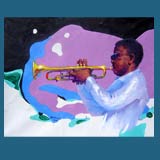 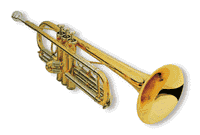 JAZZ TRUMPET JAZZ TRUMPET
 The trumpet is the highest sounding member
of the brass family. The brilliant tone of the trumpet travels through about 2
Metres of tubing bent into an oblong shape. The player presses the three valves
in various combinations with the fingers of the right hand to obtain various
pitches The trumpet is the highest sounding member
of the brass family. The brilliant tone of the trumpet travels through about 2
Metres of tubing bent into an oblong shape. The player presses the three valves
in various combinations with the fingers of the right hand to obtain various
pitches
The trumpet is
made of brass tubing bent into a rough spiral. The bore is,
roughly speaking, cylindrical, but more precisely a complex
series of tapers, smaller at the mouthpiece receiver and larger
just before the flare of the bell begins. Careful design of
these tapers is critical to the intonation of the instrument.
Sound is produced by blowing air through closed lips, producing
a "buzzing" sound into the Mouthpiece and starting a standing
wave vibration in the air column inside the trumpet. The trumpet
player can select the Pitch from a range of overtones or
harmonics by changing the lip aperture. There are three Piston
valves each of which increases the length of tubing when
engaged, thereby lowering the pitch. The first valve lowers the
instrument's pitch by a whole step, second valve by a half step,
and third valve by one-and-a-half steps. These valves alone and
in combination make the instrument fully chromatic, i.e., able
to play all twelve pitches of Western music. The sound is
projected outward by the bell.
The Mouthpiece
has a circular rim which provides a comfortable environment for
the lips' vibration. Directly behind the rim is the cup, which
channels the air into a much smaller opening (the backbore or
shank) which tapers out slightly to match the diameter of the
trumpet's lead pipe. The dimensions of these parts of the
mouthpiece affect the timbre or quality of sound, the ease of
playability, and player comfort. A wider and deeper cup are
often best suited for a fuller, more expansive sound, while
shallow-cupped "pea-shooter" mouthpieces can facilitate
execution in the extreme high register (e.g. double high c). A
larger rim allows for more assured striking of the notes, making
it less likely for the player to split the note. A smaller rim
improves endurance but decreases flexibility.

Strengthening the embouchure (muscles of the face, sometimes
"chops" in common slang). Some commonly accepted ways to do this
are:-
-
Lip slurs:
playing exercises that change notes without changing the
fingering. This forces all of the work to come from the
facial and tongue muscles as well as changes in breathing.
-
Tonguing exercises:
playing exercises that have many notes started with a sharp
definition produced by the tongue.
-
Practicing on the
mouthpiece: playing exercises on
the mouthpiece only, without the trumpet. Without the
resonating chamber of the rest of the instrument, the pitch
may vary much more freely. To be able to play something
requires development of control. Also, this may reduce the
amount of pressure one can apply. This was a favourite
exercise of the famous Rafael Mendez.
-
Playing high:
playing in the upper register, at the top of the player's
comfortable range. This is an excellent way to increase
one's range, as eventually the higher notes will become
easier and the player can move on to progressively higher
top notes.
-
Reducing pressure.
To play higher notes on the trumpet requires compression of
the embouchure (the muscles of the face and lips), as well
as air pressure to provide the energy for the vibration of
the lips. One way to compress the lips is to press the
mouthpiece firmly onto them, however this is
counterproductive in the long run and is not an effective
way of playing in the upper register. Blood cannot flow into
the lips, so they become stiff and swollen, unable to
vibrate. Also, the other muscles necessary to play without
pressure are not sufficiently developed.
-
Soft Playing.
Another aspect is playing really, really softly. Herbert L.
Clarke was the first person to really teach soft playing. In
his first exercise in the Clarke Technical Studies, he
recommends starting pianissimo and de-crescendoing until you
can barely hear it. When you play it really softly, it
teaches you how to focus your lip aperture to a fine point
so there's just a thread of air coming through.
-
Lip Buzzing.
Lip Buzzing is a helpful exercise which can help build up
stamina in the player's lips. Lip Buzzing is simply playing
the trumpet without the actual instrument. To achieve this
buzz, blow air through pursed lips as one would do when
playing the trumpet, keeping the air flow constant. Lip
Buzzing is also an excellent pitching exercise as it helps a
player to develop a sense of where the note is without the
guidance of the valves.
Embouchure
Sooner or later almost every
trumpet player is confronted with embouchure limitations and
chop problems. Change of mouthpiece, embouchure change,
braces, other teacher, dental problems, playing a different
kind of music, having to play more and longer etc. Lack of
endurance, jaw/throat/tooth/lip aches, bad tone, split
notes, limited range and even focal dystonia. Solutions vary
from creative to downright nonsense and as Jeff Smiley calls
it 'bag of tricks'. For some of the players it helps to
solve their playing problems, but a lot get stuck or get
into trouble even deeper. More than once, people stop
playing the trumpet because they think they don't have 'what
it takes', but maybe the method or the teacher does not
'have what it takes' to make it work for this student.
Just to be absolutely clear: There is no
magical method or quick fix. Developing an efficient
embouchure takes time, commitment and a lot of patience.
Somebody who claims to have gained an octave and plays the
lead chair for six hours on end after a month of method this
and that, is lying. Of course, there are always people who
can. But for most of us it is very important to choose the
right way. It is how you practice and what you practice that
counts.
A little story about myself: when I was in
my third year at the conservatory a C on the third line was
a difficult note for me. I practiced about three to four
hours a day...about practicing the right way.... Eventually
I succeeded to get control again and become an outstanding
jazz soloist, but my endurance, tone, range and the overall
feeling was not really ideal. I had to rely on having 'a
good day'. Like many trumpet players I accepted this as a
fact of life. Great range and endurance had to be something
for people with a lot of power and stamina. I assumed
playing high, long and under control was something for the
happy few.
The book 'The Balanced Embouchure' by Jeff
Smiley from the United States represented a whole new
approach. At this time there are more and more people that
support BE, at least as much people that don't believe a
word of it. In a lot of trumpet fora around the world, there
are heated discussions about this method. Anyway, I ordered
it, read it, and after shaking my head in disbelief for
about hundred times, I found that there was some logic in
this story. I had a last big laugh and started doing these
very strange exercises. I can only say that I improved
beyond every expectation and I think there is not one book
that is so clear about how to develop your embouchure in an
efficient and safe way. Bert Lochs
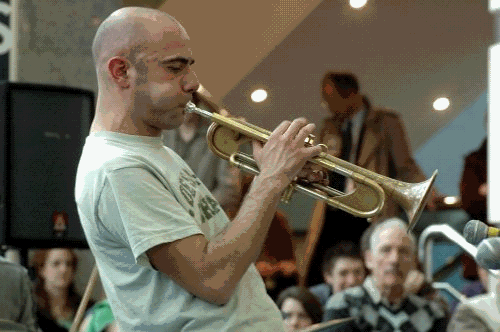 Ray
Butcher
(b. Southsea, 1973) started on cornet at age eight influenced by his older
brother, also then a cornettist in the Royal Marines. Ray quickly moved up the
ranks on the local brass band scene to take the soprano cornet chair at age
eleven. He remained faithful to the band run by first teacher Henry Capper until
age 16 by which time he was principal cornet. Having been attracted to Louis
Armstrong, Ellington and Glenn Miller, he expressed interest in becoming an all
round player, having decided long before to become a pro. He studied classical
trumpet at the prestigious Peter Symonds' college, Winchester, but became
disillusioned with classical music as his next teacher altered his embouchure
position. Ray
Butcher
(b. Southsea, 1973) started on cornet at age eight influenced by his older
brother, also then a cornettist in the Royal Marines. Ray quickly moved up the
ranks on the local brass band scene to take the soprano cornet chair at age
eleven. He remained faithful to the band run by first teacher Henry Capper until
age 16 by which time he was principal cornet. Having been attracted to Louis
Armstrong, Ellington and Glenn Miller, he expressed interest in becoming an all
round player, having decided long before to become a pro. He studied classical
trumpet at the prestigious Peter Symonds' college, Winchester, but became
disillusioned with classical music as his next teacher altered his embouchure
position.
He could play nowhere near as well as before, so took up
piano, where he rapidly progressed. (He got into 'cocktail piano' having
listened to Liberace - believe it or not!). At Kingston University he made a
living on the side as a cocktail pianist, culminating in some dates at 'Stringfellows'
nightclub, where he literally walked in and asked, as was his custom, 'do you
need a pianist?' with one of his mates. One thing led to another and he got back
into jazz trumpet, starting with a now London sax star Charlotte Glasson (also
at Kingston, where Ray used to share classes with Hard Fi's Richard Archer and
Andy Gardener of 'U SURE DO' fame (strike). Having left Kingston he practised
relentlessly and got into NYJO, and moved on the Holland America line cruise
ship 'MS RYNDAM'.
 On
moving to Birmingham, he took up the trumpet chair in 'King Pleasure and the
Biscuit Boys' on NYJO leader Bill Ashton's recommendation. Things were short
lived and having toured Europe extensively, playing alongside BB King, Afro
Cuban all stars, James Carter, etc,. He had a brief period on the ships again,
sailing from his home town of Portsmouth, and decided to give up being a pro.
After a year off he was back and started playing with local players at the
Medicine Bar, where he met Sam Pearce (tenor sax) this led to an association
that introduced to Venezuelan piano star Edgar Marcias. He was in good hands. He
has gigged around Birmingham ever since. on the local scene has worked with all
the big names (including Jean Toussiant, Tony Levin, Julian Siegel and Liam
Noble) and most notably has been invited to regularly perform with top pianist
Tim Amann and the Xtet.
Ray is a superlative and extremely versatile jazz
trumpeter whose influences include such diverse musical legends as Louis
Armstrong and Miles Davis. On
moving to Birmingham, he took up the trumpet chair in 'King Pleasure and the
Biscuit Boys' on NYJO leader Bill Ashton's recommendation. Things were short
lived and having toured Europe extensively, playing alongside BB King, Afro
Cuban all stars, James Carter, etc,. He had a brief period on the ships again,
sailing from his home town of Portsmouth, and decided to give up being a pro.
After a year off he was back and started playing with local players at the
Medicine Bar, where he met Sam Pearce (tenor sax) this led to an association
that introduced to Venezuelan piano star Edgar Marcias. He was in good hands. He
has gigged around Birmingham ever since. on the local scene has worked with all
the big names (including Jean Toussiant, Tony Levin, Julian Siegel and Liam
Noble) and most notably has been invited to regularly perform with top pianist
Tim Amann and the Xtet.
Ray is a superlative and extremely versatile jazz
trumpeter whose influences include such diverse musical legends as Louis
Armstrong and Miles Davis.
His generous spirit is reflected in his playing, always connecting well with his
audience. Ray Butcher’s brass arrangements are particularly pleasing”. In
2003 Ray played the trumpet solo at the world premier of “Requiem for Ground
Zero”, by Steven Berkoff. He has recently returned from playing first
trumpet in the International Christian Embassy of Jerusalem Orchestra. He’s
played with R&B singers such as Beverly Knight and Angel Lee.Ray also works
extensively with Trio Gitano, including performances at the Birmingham Symphony
Hall, where the trio are performing with Ray as a special guest on trumpet. Ray
is currently completing a new CD called ”War on the Saints” and featuring
musicians Edgar Macías, Chris Bowden, Peter Daly, Mike Green, Miles Levin and
Simeon Murray.
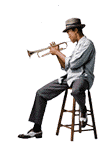 Trumpet Topics Trumpet Topics
http://www.trumpetstuff.com/
http://www.andrewcolman.com/index.htm
Wynton
Marsalis
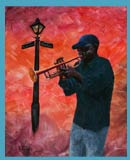 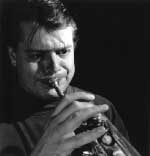 Steve Waterman
is renowned as one of the
top British jazz trumpet players both at home and on the international scene,
he began his career while studying at Trinity College Of Music, and since
then has worked regularly on the British and European jazz scene. Steve Waterman
is renowned as one of the
top British jazz trumpet players both at home and on the international scene,
he began his career while studying at Trinity College Of Music, and since
then has worked regularly on the British and European jazz scene.
He is professor of Jazz Trumpet at The
Royal Academy of Music and Trinity College of Music in London and
visiting Jazz Trumpet specialist at The Royal Northern College of
Music and The Welsh College of Music & Drama.
http://www.jamiefinlay.com/#
http://www.jazztrumpet.co.uk/home.html
http://www.jazztrumpetsolos.com/Dizzy.htm

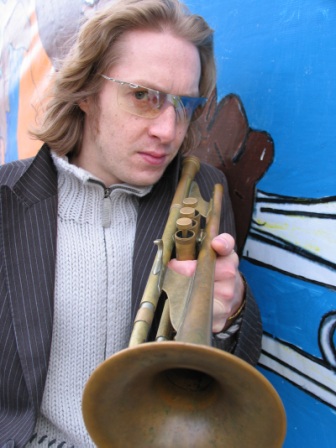 Bryan
Corbett Bryan
Corbett
Born 1974 In Hereford, England.
Brought up in Hereford and Worcester studying at Hereford Sixth Form College and
later at L.I.H.E. (Hope University) Liverpool, moving to Birmingham in 1996 to
work in the music industry. Now a professional trumpet player. Other
educational experiences and qualification came via London College of Music,
Royal Northern College of Music, International Music Camp – USA, Music
Scholarship- Norway, Rehearsal Orchestra Course - Edinburgh Festival
Randy
Brecker
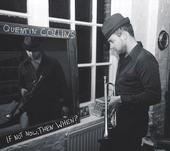 Quentin
Collins Quentin
Collins
Quentin Collins is one of London's most
in-demand young jazz musicians already with a wealth of experience- working with
the likes of Jean Toussaint, Stan Tracey, Norma Winstone, John Surman, Tim
Garland, Tony Kofi and Ray Gelato on the jazz circuit. Also sought after on the
pop circuit where he has worked with US3, Jocelyn Brown, Lulu, has for the last
4 years been touring with Omar, and was the brass voice of Basement Jaxx over a
five year period. Album credits include, 4hero - 2 Pages; Basement Jaxx -
Rooty + 3 tracks on recent no.1 album "The Singles" + several B side single
releases; Mike Garrick - Peter Pan Suite (featured soloist on opening track
Peter Pan) + Big Band Harriot; Dylan Howe 5te t- This Is It; Basil Hodge- My
Guardian Angel; Antonio Cabrita- Pictures, which was voted jazz album of 2004 in
Portugal.
QC
Trumpet
IAN CARR
Trumpeter, composer, author, educator and broadcaster, Ian Carr is a
major force in British Jazz and has been since 1970 one of Europe's leading
musicians.
In September 1969 Ian formed his group "Nucleus" which was one of the earliest
pioneers of electronic jazz-rock fusion. The early Nucleus albums had a wide
seminal influence in Europe, introducing musicians, critics and lay persons to
the new music.
Nucleus won first prize at the 1970 Montreux International Jazz Festival and
appeared that summer at the USA Newport Festival and the Village Gate, New York.
The Band's new music caused something of a sensation on both US occasions.
Between the years 1969-89 Nucleus has done radio and TV shows, toured all over
the Western and Eastern Europe, Northern India, South America and Mexico, and
played at most major International Festivals.
Since 1975 Ian has been a member of the distinguished and immensely successful
international band. "The United Jazz Rock Ensemble" which has recorded several
of his compositions.
In 1982, Ian received the Calabria (Southern Italy) award for outstanding
contribution in the field of jazz. In 1987 he was given Wire Magazine's special
award for services to British Jazz. That year Ian played with Michael Gibb's
Band at the Bracknell Festival and was feature soloist with the Hamburg Radio
Orchestra under Gibb's Direction.
In August 1989 he toured in Britain and Europe as a soloist on electronic
trumpet with an Anglo-American orchestra led by the legendary American composer,
George Russell. In recent year Ian has become almost as well known as an author.
He was a co-author of Jazz: "The Essential Companion" a Jazz Encyclopaedia.
"Music Outside", published in 1973 was an acclaimed account of the contemporary
British scene. His 1982 book on Miles Davis remains the definitive biography. He
has recently finished a biography of Keith Jarrett. Ian was associate Professor
at the Guildhall School of Music and Drama where he gave weekly lectures on jazz
history. He also conducted weekly workshops at Interchange in North London.
He was diagnosed as suffering from Alzheimer's disease and passed away in 2009.
Martin Shaw, - Trumpet & Flugel Horn
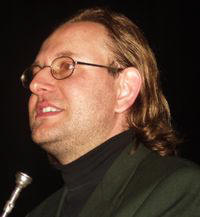 Martin
was born in November 1966 into a family of musicians, both his mother and Father
being accomplished pianists. He began piano lessons at the age of 9 and
started studying the trumpet at the age of 11. Four years later Martin became a
member of the National Youth Orchestra of Great Britain and remained there for 3
years, playing a varied program of large orchestral works with some of the
worlds leading conductors. Martin
was born in November 1966 into a family of musicians, both his mother and Father
being accomplished pianists. He began piano lessons at the age of 9 and
started studying the trumpet at the age of 11. Four years later Martin became a
member of the National Youth Orchestra of Great Britain and remained there for 3
years, playing a varied program of large orchestral works with some of the
worlds leading conductors.
In 1985 Martin gained a place at the Royal Academy of Music in London to study
classical trumpet and Jazz graduating after three years with a G.R.S.M hons
degree and an L.R.A.M. In 1989 Martin was invited to study at Berklee college of
music in Boston, before returning to London to finish his studies at the
Guildhall School of Music with a one-year post graduate course in jazz and
studio music.
Over the last 12 years Martin has worked with many leading jazz artists
including Cleo Laine, John Dankworth, Pete King, Dick Morrisey, Tim Garland and
numerous big bands including the BBC Big Band, currently led by trombonist Jiggs
Whigham. Along with session and T.V. work Martin still finds time to perform
with classical ensembles and in West End shows
During the last 12 years Martin has also recorded, performed live and toured
extensively with various pop artists including Sting, Jamiroquai, Natalie Cole,
Paul Young and the Brand New Heavies.
In 2001, Martin was appointed professor of Jazz Trumpet at the Birmingham
Conservatoire, a faculty of the University of Central England. He is currently
on tour with French artist Patricia Kaas.
John Hoare
(Trumpet & Flugel Horn) has been carving a career in jazz and commercial
music both as a trumpet player and as a composer. His trumpet has taken him
around the world, working as a sideman for the likes of Jamie Cullum,
The Super Furry Animals, Ilya and Shirley Bassey. His own
group, "JH4", (formed in 1997) have recorded one album and are currently working
towards the second. He is also the recipient of an award for "Outstanding
Musicianship" from Berklee College of Music, Boston and a Degree in Music from
Oxford Brookes. John is now working on his Sextet (JH6) which includes:-Barnaby Dickinson -
trombone
Ben Castle - saxes and flutes
Ross Stanley - piano
Richard Pryce - bass
Charlie Stratford - Drums
 Andy
Davies
trumpeter,
comes from Gower in South Wales and is a jazz graduate of Trinity College of
Music in London where he was a student of Steve Waterman. In 2003 he was
awarded a Trinity College of Music Silver Medal for Outstanding Performance
in Jazz Studies. While still a student, Andy was the guest trumpet soloist
with the singer Ian Shaw and his Trio appearing at Blackheath, Croydon,
Grimsby, the 606 club, Brecon Jazz festival and Ronnie Scott’s. Andy has
performed with numerous artists including Gwyneth Herbert and Robin Jones,
and is a featured soloist on Iris Festenstien’s CD, ‘One Good Scandal’ (33
Records). He has appeared at all the major venues in London Andy
Davies
trumpeter,
comes from Gower in South Wales and is a jazz graduate of Trinity College of
Music in London where he was a student of Steve Waterman. In 2003 he was
awarded a Trinity College of Music Silver Medal for Outstanding Performance
in Jazz Studies. While still a student, Andy was the guest trumpet soloist
with the singer Ian Shaw and his Trio appearing at Blackheath, Croydon,
Grimsby, the 606 club, Brecon Jazz festival and Ronnie Scott’s. Andy has
performed with numerous artists including Gwyneth Herbert and Robin Jones,
and is a featured soloist on Iris Festenstien’s CD, ‘One Good Scandal’ (33
Records). He has appeared at all the major venues in London
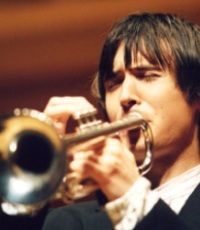 including Ronnie
Scott’s, Pizza Express Dean Street, 606 Club, The Vortex, Pizza on the Park,
The Crypt and toured Europe playing in jazz festivals and clubs as a sideman
and leading his own quartet. including Ronnie
Scott’s, Pizza Express Dean Street, 606 Club, The Vortex, Pizza on the Park,
The Crypt and toured Europe playing in jazz festivals and clubs as a sideman
and leading his own quartet.
He has been described as ‘one of the most sensitive and creative
trumpeters to emerge on the British jazz scene in recent years’ whose ‘strength
is his ability to marry a first-class technique and marvellously clear tone
with elegant, emotive phrasing. His compositional style has been called
‘classy, melodic music with unexpected twists’.
Current Quartet
Andy Davies : trumpet,
Lorenzo Bassignani: bass,
Ivo Neame: piano,
Reinis Axelsson: drums
Contact Nos
0044(0)7720247689 / 0044(0)7946098005
 Stuart Henderson Stuart
began his musical career as an army musician in 1980 at the Household Division
Junior Musicians Wing, Pirbright with a further year at the Royal Military
School of Music Kneller Hall. Whilst there he won the Frank Wright cornet
soloist competition and the Worshipful Company of Musicians Bronze Medal for
outstanding instrumentalists. He performed many solos on the bandstand during
the summer concert season and was also part of the Kneller Hall fanfare
trumpeters that performed at St Paul’s Cathedral, the Barbican Centre and the
Royal Festival Hall. Stuart Henderson Stuart
began his musical career as an army musician in 1980 at the Household Division
Junior Musicians Wing, Pirbright with a further year at the Royal Military
School of Music Kneller Hall. Whilst there he won the Frank Wright cornet
soloist competition and the Worshipful Company of Musicians Bronze Medal for
outstanding instrumentalists. He performed many solos on the bandstand during
the summer concert season and was also part of the Kneller Hall fanfare
trumpeters that performed at St Paul’s Cathedral, the Barbican Centre and the
Royal Festival Hall.
From 1983 until late 2006 Stuart served as a member of the Band of the Scots
Guards and during that time performed at venues the world over, including
Columbia Artists tours of the USA and Canada, Australia, New Zealand, Hong Kong,
Germany and Monte Carlo. After just three years with the band he was made
principal trumpet, subsequently becoming leader of the fanfare trumpeters and
dance band as well as soloist within the band. Whilst with the band Stuart
performed at every major state occasion including Trooping of the Colour, the
Cenotaph, Festival of Remembrance and seven times at the Edinburgh Military
Tattoo. In 2002 Stuart was appointed Band Sergeant playing leading roles in
both, the State Funeral of Queen Elizabeth, the Queen Mother and Queen Elizabeth
II Golden Jubilee celebrations. Stuart instigated the founding of the Household
Division Big Band and went on to become leader and musical director, leading the
band at venues such as the Grosvenor House Hotel and The South Bank. He attained
Licentiate of Trinity College London (LTCL). Moving to Reading, Stuart
became a member of Hugh Turner’s quartet with a residency at JW’s in Gun St.,
also joining the Tim Hills Pandemonium Band and Tongues of Fire. Stuart was also
founder member of the Reading based funk band Funk Assembly which went on to
appear at Ronnie Scott’s Club and The Jazz Café Camden Town.
  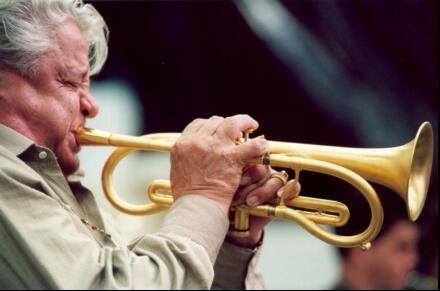
|


 JAZZ TRUMPET
JAZZ TRUMPET

 On
moving to Birmingham, he took up the trumpet chair in 'King Pleasure and the
Biscuit Boys' on NYJO leader Bill Ashton's recommendation. Things were short
lived and having toured Europe extensively, playing alongside BB King, Afro
Cuban all stars, James Carter, etc,. He had a brief period on the ships again,
sailing from his home town of Portsmouth, and decided to give up being a pro.
After a year off he was back and started playing with local players at the
Medicine Bar, where he met Sam Pearce (tenor sax) this led to an association
that introduced to Venezuelan piano star Edgar Marcias. He was in good hands. He
has gigged around Birmingham ever since. on the local scene has worked with all
the big names (including Jean Toussiant, Tony Levin, Julian Siegel and Liam
Noble) and most notably has been invited to regularly perform with top pianist
Tim Amann and the Xtet.
Ray is a superlative and extremely versatile jazz
trumpeter whose influences include such diverse musical legends as Louis
Armstrong and Miles Davis.
On
moving to Birmingham, he took up the trumpet chair in 'King Pleasure and the
Biscuit Boys' on NYJO leader Bill Ashton's recommendation. Things were short
lived and having toured Europe extensively, playing alongside BB King, Afro
Cuban all stars, James Carter, etc,. He had a brief period on the ships again,
sailing from his home town of Portsmouth, and decided to give up being a pro.
After a year off he was back and started playing with local players at the
Medicine Bar, where he met Sam Pearce (tenor sax) this led to an association
that introduced to Venezuelan piano star Edgar Marcias. He was in good hands. He
has gigged around Birmingham ever since. on the local scene has worked with all
the big names (including Jean Toussiant, Tony Levin, Julian Siegel and Liam
Noble) and most notably has been invited to regularly perform with top pianist
Tim Amann and the Xtet.
Ray is a superlative and extremely versatile jazz
trumpeter whose influences include such diverse musical legends as Louis
Armstrong and Miles Davis.





 Carr
was born in
Carr
was born in
 Martin
was born in November 1966 into a family of musicians, both his mother and Father
being accomplished pianists. He began piano lessons at the age of 9 and
started studying the trumpet at the age of 11. Four years later Martin became a
member of the National Youth Orchestra of Great Britain and remained there for 3
years, playing a varied program of large orchestral works with some of the
worlds leading conductors.
Martin
was born in November 1966 into a family of musicians, both his mother and Father
being accomplished pianists. He began piano lessons at the age of 9 and
started studying the trumpet at the age of 11. Four years later Martin became a
member of the National Youth Orchestra of Great Britain and remained there for 3
years, playing a varied program of large orchestral works with some of the
worlds leading conductors.
 including Ronnie
Scott’s, Pizza Express Dean Street, 606 Club, The Vortex, Pizza on the Park,
The Crypt and toured Europe playing in jazz festivals and clubs as a sideman
and leading his own quartet.
including Ronnie
Scott’s, Pizza Express Dean Street, 606 Club, The Vortex, Pizza on the Park,
The Crypt and toured Europe playing in jazz festivals and clubs as a sideman
and leading his own quartet. 


